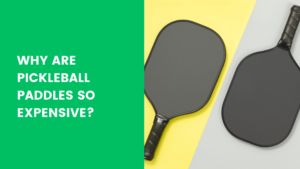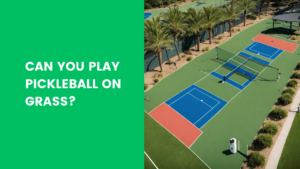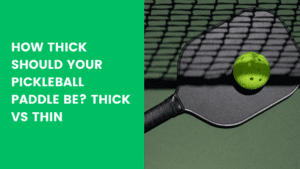Pickleball, a rapidly growing sport known for its blend of tennis, badminton, and table tennis, boasts a unique set of rules that add layers of strategy and complexity to the game. Among these rules, understanding the Non-Volley Zone (NVZ) is paramount to success on the court.
Explanation of the NVZ
The Non-Volley Zone, often referred to as “the kitchen,” is a seven-foot area adjacent to the net on both sides of the pickleball court. It is marked by lines perpendicular to the net. The NVZ extends seven feet back from the net and is a critical component of the game’s structure.
Purpose of the NVZ
The primary purpose of the NVZ is to prevent players from executing volleys (hitting the ball in the air before it bounces) while positioned too close to the net. This rule encourages longer rallies and strategic shot placement, adding depth to the gameplay.
Rules Governing the Non-Volley Zone
Understanding the rules governing the NVZ is essential for players aiming to excel in pickleball. Adhering to these rules not only ensures fair play but also contributes to a more enjoyable and competitive experience for all participants.
Staying out of the NVZ during volleys
The fundamental rule regarding the NVZ is that players cannot volley the ball while standing within the zone. This means that any attempt to hit the ball out of the air must be made from outside the NVZ lines. Failure to comply results in a fault.
Exceptions to the NVZ rule
While the NVZ restricts volleying near the net, there are exceptions to this rule. Players are allowed to enter the NVZ to play a ball that has bounced, provided they do not volley it. This allows for strategic positioning and shot selection, even within the confines of the NVZ.
Strategies for Playing Around the Non-Volley Zone
Mastering the art of playing around the NVZ is essential for pickleball players seeking to elevate their game. By implementing strategic techniques and maintaining awareness of NVZ boundaries, players can gain a competitive edge on the court.
Techniques for playing near the NVZ line
One effective strategy for playing around the NVZ is to position oneself close to the line without stepping into the zone. This allows players to remain within striking distance of the net while still adhering to NVZ regulations. Additionally, mastering soft shots and dinks can help players control the pace of the game near the kitchen.
Advantages of mastering NVZ strategies
Players who excel in navigating the NVZ enjoy several advantages on the court. By effectively utilizing NVZ strategies, players can force opponents into difficult positions, create opportunities for winning shots, and maintain control of the rally. Additionally, mastering NVZ techniques minimizes the risk of committing faults and penalties.
Common Mistakes to Avoid in the Kitchen
While the NVZ serves as a critical aspect of pickleball gameplay, it also presents challenges for players, particularly those new to the sport. Avoiding common mistakes in the kitchen is essential for maintaining a competitive edge and avoiding penalties during matches.
Stepping into the NVZ unintentionally
One of the most common mistakes players make in the kitchen is inadvertently stepping into the NVZ while attempting to play a ball near the net. This often results in a fault and gives the opposing team an advantage in the rally. Maintaining awareness of NVZ boundaries and foot placement is crucial for avoiding this error.
Penalties for violating NVZ rules
In pickleball, violating NVZ rules carries penalties that can impact the outcome of a match. Players who volley the ball while standing within the NVZ or step into the zone before the ball has bounced risk losing the point or conceding a side-out to the opposing team. Understanding and adhering to NVZ regulations is essential for avoiding such penalties.
Practicing Non-Volley Zone Etiquette
In addition to understanding the rules governing the NVZ, practicing proper etiquette in the kitchen is essential for fostering a respectful and competitive playing environment. By adhering to NVZ etiquette guidelines, players can promote fair play and sportsmanship on the court.
Importance of fair play
Maintaining integrity and fairness in pickleball is paramount to the enjoyment and success of the game. By following NVZ rules and demonstrating good sportsmanship, players contribute to a positive playing experience for themselves and their opponents.
Tips for practicing NVZ etiquette during games
Practicing NVZ etiquette involves more than simply avoiding faults and penalties. Players should also strive to communicate effectively with their partners, show respect for opponents, and exhibit grace in both victory and defeat. By upholding these principles, players can elevate the level of competition and foster a sense of camaraderie among participants.
Also read the Mastering Pickleball Terminology: A Comprehensive Guide
Improving Non-Volley Zone Awareness
Enhancing NVZ awareness is a continual process that requires dedication and practice on the part of pickleball players. By honing their NVZ skills and developing a keen understanding of court dynamics, players can gain a competitive advantage and elevate their performance on the court.
Techniques for improving NVZ awareness on the court
One effective technique for improving NVZ awareness is to focus on footwork and positioning during practice sessions. By practicing drills that emphasize movement around the kitchen and maintaining proper distance from the net, players can develop muscle memory and instinctively react to NVZ boundaries during matches.
Drill ideas for honing NVZ skills
There are several drills that players can incorporate into their training regimen to improve NVZ awareness and proficiency. These drills may include practicing dinks and drops near the net, performing quick reaction exercises to simulate NVZ scenarios, and engaging in controlled gameplay focused on NVZ strategies. By dedicating time and effort to these drills, players can refine their NVZ skills and gain confidence in their ability to navigate the kitchen effectively.
Role of Non-Volley Zone in Pickleball Strategy
The NVZ plays a crucial role in shaping the overall strategy and dynamics of pickleball gameplay. By incorporating NVZ considerations into their strategic approach, players can capitalize on opportunities, overcome challenges, and enhance their chances of success on the court.
Incorporating NVZ considerations into overall gameplay strategy
Successful pickleball strategy involves more than simply hitting the ball over the net. Players must also consider factors such as court positioning, shot selection, and opponent tendencies when formulating their game plan. By integrating NVZ considerations into their strategic approach, players can exploit weaknesses in their opponents’ positioning and maximize their own effectiveness near the net.
How NVZ rules affect game dynamics
The rules governing the NVZ have a significant impact on the flow and tempo of pickleball matches. By restricting volleys near the net, NVZ rules encourage players to engage in longer rallies, employ strategic shot placement, and utilize finesse shots such as dinks and drops. This adds an element of strategy and skill to the game, requiring players to balance aggression with precision and control.
Challenges of Adhering to Non-Volley Zone Rules
While understanding and adhering to NVZ rules is essential for success in pickleball, players may encounter challenges in maintaining compliance during matches. Overcoming these challenges requires discipline, awareness, and a willingness to adapt one’s gameplay strategy as needed.
Balancing aggressive play with NVZ restrictions
One of the primary challenges players face in pickleball is balancing aggressive play with NVZ restrictions. While attacking the net can put pressure on opponents and create scoring opportunities, it also increases the risk of stepping into the NVZ and committing a fault. Finding the right balance between offensive aggression and defensive discipline is essential for success on the court.
Overcoming NVZ-related challenges during matches
In addition to maintaining NVZ compliance, players may encounter various challenges related to the NVZ during matches. These challenges may include opponents who exploit NVZ vulnerabilities, unfavorable court conditions that affect footwork and positioning, and mental pressure to perform under the scrutiny of NVZ rules. Overcoming these challenges requires focus, resilience, and a willingness to adapt one’s gameplay strategy as needed.
Benefits of Strictly Enforcing NVZ Rules
While adhering to NVZ rules may present challenges for players, strict enforcement of these rules yields numerous benefits for the sport as a whole. By promoting fairness, integrity, and sportsmanship, NVZ rules contribute to a positive playing environment and enhance the overall pickleball experience for participants at all levels.
Promoting fairness and sportsmanship
Strict enforcement of NVZ rules ensures that all players adhere to the same standards of gameplay, promoting fairness and equity on the court. By preventing players from gaining an unfair advantage through NVZ violations, these rules uphold the principles of sportsmanship and integrity that are central to pickleball’s ethos.
Ensuring a level playing field for all players
NVZ rules help to create a level playing field where success is determined by skill, strategy, and sportsmanship rather than by exploitation of rule loopholes or technicalities. By holding players accountable for their actions within the NVZ, referees and officials contribute to a more competitive and enjoyable playing environment for all participants.
Common Misconceptions About the Non-Volley Zone
Despite its importance in pickleball gameplay, the NVZ is often subject to misconceptions and misunderstandings among players, particularly those new to the sport. Dispelling these misconceptions is essential for promoting clarity and understanding of NVZ rules and regulations.
Addressing misunderstandings about NVZ rules
One common misconception about the NVZ is that players are prohibited from entering the zone at any time. In reality, players are allowed to enter the NVZ to play a ball that has bounced, provided they do not volley it. Clarifying this rule and its exceptions can help players better understand their options near the net.
Clarifying misconceptions that may affect gameplay
Another common misconception about the NVZ is that violations of NVZ rules always result in penalties or faults. While stepping into the NVZ during a volley does indeed result in a fault, there are exceptions to this rule, such as playing a ball that has bounced. By clarifying these nuances, players can avoid unnecessary penalties and make informed decisions on the court.
Importance of Referees in Enforcing NVZ Rules
Ensuring compliance with NVZ rules and regulations is a collaborative effort that involves players, referees, and officials working together to maintain a fair and competitive playing environment. The role of referees in enforcing NVZ rules is essential for upholding the integrity of the game and promoting a positive experience for all participants.
Role of referees in maintaining NVZ integrity
Referees play a crucial role in enforcing NVZ rules and regulations during matches. By closely monitoring player movements near the net and enforcing penalties for NVZ violations, referees help to maintain fairness and consistency on the court. Their impartiality and attention to detail contribute to a level playing field where all players abide by the same standards of gameplay.
How referees contribute to a positive playing environment
In addition to enforcing NVZ rules, referees also contribute to a positive playing environment by promoting sportsmanship, respect, and fair play among participants. By providing guidance and clarification on NVZ regulations when needed, referees help to ensure that matches proceed smoothly and that disputes are resolved quickly and fairly. Their presence on the court adds an extra layer of accountability and professionalism to pickleball competitions at all levels.
Educating New Players About the Non-Volley Zone
As pickleball continues to grow in popularity, it is essential to educate new players about the rules and regulations governing the sport, including those related to the NVZ. By providing clear and comprehensive instruction on NVZ rules, coaches, instructors, and experienced players can help newcomers develop a solid understanding of the game and enjoy a positive experience on the court.
Importance of teaching NVZ rules to beginners
For players new to pickleball, understanding NVZ rules and regulations can be challenging, as they may differ from those of other racket sports. By emphasizing the significance of the NVZ and explaining its role in shaping gameplay dynamics, instructors can equip beginners with the knowledge and skills they need to succeed on the court. This foundational understanding lays the groundwork for continued improvement and enjoyment of the sport.
Resources for learning about NVZ regulations
In addition to hands-on instruction, there are various resources available to help players learn about NVZ rules and regulations. These may include instructional videos, rulebooks, online forums, and workshops led by experienced players and coaches. By exploring these resources and seeking guidance from knowledgeable sources, players can deepen their understanding of NVZ rules and enhance their overall pickleball experience.
Future Developments in Non-Volley Zone Regulations
As pickleball continues to evolve and grow, it is likely that NVZ rules and regulations will undergo further refinement and adaptation to meet the changing needs of the sport. By staying informed about potential developments in NVZ regulations, players can remain at the forefront of the game and adapt their strategies accordingly.
Potential changes to NVZ rules and their implications
Future developments in NVZ regulations may include adjustments to the size or location of the zone, modifications to existing rules, or the introduction of new guidelines to address emerging challenges or trends in pickleball gameplay. While any changes to NVZ regulations are intended to improve the sport and enhance the playing experience for participants, they may also require players to adapt their strategies and techniques accordingly.
Keeping abreast of updates in pickleball regulations
To stay informed about potential changes to NVZ rules and regulations, players can consult official governing bodies, attend rule clinics and workshops, and participate in discussions within the pickleball community. By remaining proactive and engaged, players can ensure that they are well-prepared to adapt to any future developments in NVZ regulations and continue to excel in the sport.
Conclusion
In conclusion, understanding the Non-Volley Zone (NVZ) and its associated rules is essential for success in pickleball. By mastering NVZ strategies, practicing proper etiquette, and staying informed about rule changes, players can enhance their performance on the court and enjoy a more rewarding pickleball experience. As the sport continues to evolve, adherence to NVZ regulations will remain a cornerstone of fair play and sportsmanship in pickleball.
FAQs (Frequently Asked Questions)
- What happens if a player steps into the Non-Volley Zone during a volley?
- Stepping into the Non-Volley Zone during a volley results in a fault, and the opposing team is awarded the point or a side-out, depending on the situation.
- Are there any exceptions to the Non-Volley Zone rule?
- Yes, players are allowed to enter the Non-Volley Zone to play a ball that has bounced, provided they do not volley it before it bounces.
- Can players reach over the net to hit a ball in the Non-Volley Zone?
- No, players are not permitted to reach over the net to hit a ball in the Non-Volley Zone. Doing so results in a fault.
- How can I improve my awareness of the Non-Volley Zone during matches?
- Improving awareness of the Non-Volley Zone involves practicing footwork, positioning, and shot selection during drills and matches. By focusing on NVZ boundaries and maintaining proper distance from the net, players can enhance their NVZ awareness over time.
- What role do referees play in enforcing Non-Volley Zone rules?
- Referees play a crucial role in enforcing Non-Volley Zone rules during matches by monitoring player movements near the net and enforcing penalties for NVZ violations. Their impartiality and attention to detail contribute to a fair and competitive playing environment for all participants.






Pingback: Pickleball Rules-Two Bounce vs Double Bounce - All about pickleball